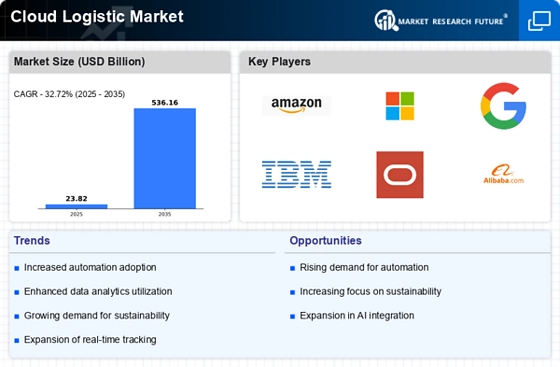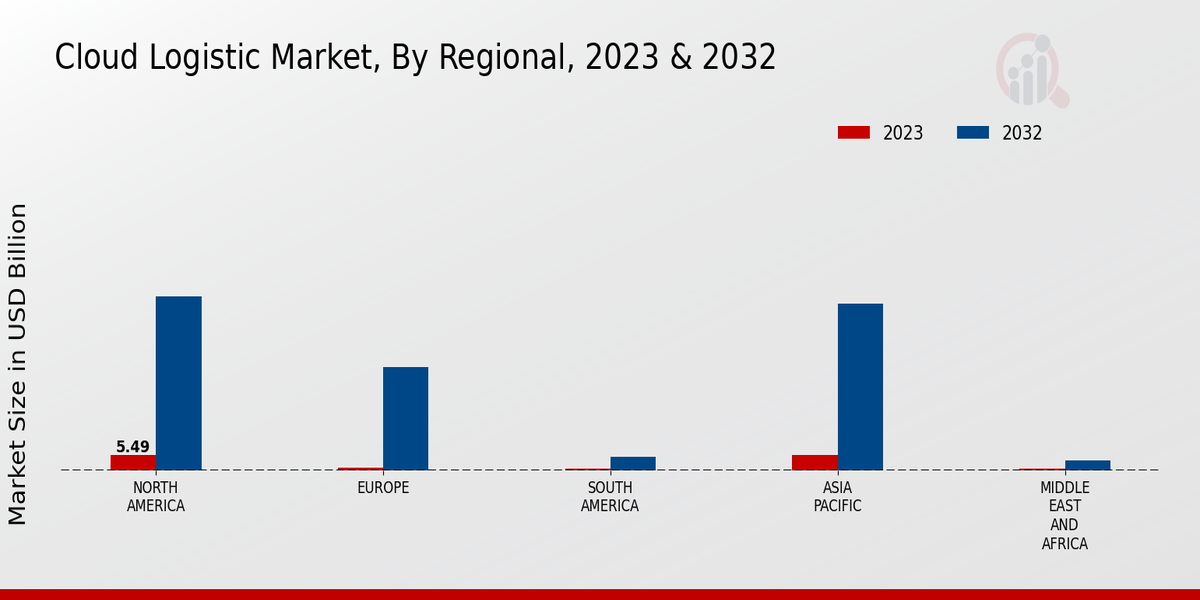Growing Importance of Data Analytics
Data analytics is emerging as a crucial driver in the Cloud Logistic Market. The ability to collect, analyze, and interpret vast amounts of data is transforming logistics operations. Companies are increasingly leveraging data analytics to gain insights into customer behavior, optimize routes, and enhance inventory management. In 2025, the market for data analytics in logistics is projected to expand significantly, reflecting the growing recognition of its value in decision-making processes. By utilizing cloud-based analytics tools, logistics providers can make informed decisions that improve efficiency and reduce costs. This trend underscores the importance of data-driven strategies in the Cloud Logistic Market, as organizations strive to remain competitive in an increasingly complex environment.
Integration of Advanced Technologies
The integration of advanced technologies is a pivotal driver in the Cloud Logistic Market. Technologies such as artificial intelligence, machine learning, and the Internet of Things are being increasingly utilized to enhance logistics operations. These technologies facilitate predictive analytics, enabling companies to forecast demand and optimize inventory levels. In 2025, the market for AI in logistics is projected to reach a substantial value, reflecting the growing reliance on data-driven decision-making. Furthermore, the adoption of IoT devices allows for real-time tracking of shipments, improving transparency and efficiency in the supply chain. As logistics providers continue to embrace these innovations, the Cloud Logistic Market is likely to witness accelerated growth, driven by the need for enhanced operational capabilities and improved service delivery.
Emphasis on Customer-Centric Logistics
The Cloud Logistic Market is witnessing a pronounced emphasis on customer-centric logistics. As consumer expectations evolve, logistics providers are compelled to adopt strategies that prioritize customer satisfaction. Cloud logistics solutions enable companies to offer personalized services, real-time tracking, and enhanced communication with customers. In 2025, the demand for customer-centric logistics is expected to grow, as businesses recognize the importance of delivering exceptional service to retain customers. By leveraging cloud-based platforms, organizations can streamline their operations and respond more effectively to customer needs. This shift towards customer-centricity is likely to drive innovation and growth within the Cloud Logistic Market, as companies seek to differentiate themselves in a competitive landscape.
Rising Demand for E-commerce Solutions
The Cloud Logistic Market is experiencing a notable surge in demand for e-commerce solutions. As online shopping continues to gain traction, logistics providers are increasingly adopting cloud-based systems to enhance their operational efficiency. In 2025, it is estimated that e-commerce sales will account for a substantial portion of total retail sales, necessitating advanced logistics solutions. Cloud logistics enables real-time inventory management, order tracking, and streamlined supply chain processes, which are essential for meeting consumer expectations. This shift towards e-commerce is driving investments in cloud logistics technologies, as companies seek to optimize their delivery networks and improve customer satisfaction. Consequently, the Cloud Logistic Market is poised for significant growth as businesses adapt to the evolving landscape of retail and consumer behavior.
Focus on Cost Efficiency and Operational Agility
Cost efficiency and operational agility are increasingly becoming focal points within the Cloud Logistic Market. Companies are under constant pressure to reduce operational costs while maintaining high service levels. Cloud logistics solutions offer scalable and flexible options that allow businesses to adapt to changing market conditions without incurring significant capital expenditures. In 2025, the demand for cost-effective logistics solutions is expected to rise, as organizations seek to streamline their operations and improve their bottom line. By leveraging cloud-based platforms, companies can optimize their supply chain processes, reduce lead times, and enhance overall productivity. This emphasis on cost efficiency is likely to propel the growth of the Cloud Logistic Market, as businesses prioritize solutions that deliver both financial and operational benefits.


















Leave a Comment